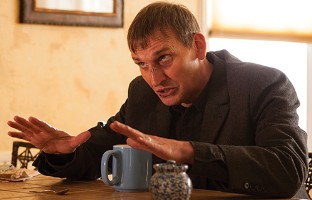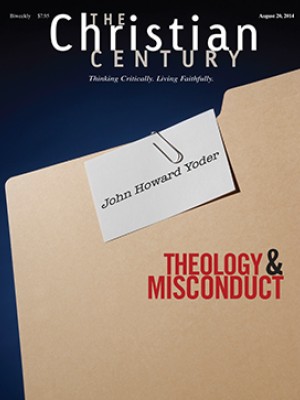Those left behind

Mainstream popular culture tends to prefer human-made cataclysms to the biblical variety. We love to be entertained by portrayals of environmental disasters, viruses unleashed by unethical experimentation, or aliens swooping in to take advantage of our shoddy management of Earth. But there’s little room for good old-fashioned divine intervention.
This might be changing. The new Noah movie and the coming remake of the Left Behind series, starring Nicholas Cage, put a divine agent front and center, and the new HBO drama The Leftovers breathes an air of supernatural mystery into the genre. God is not present directly, but the disaster that befalls humankind has a biblical ring to it.
Read our latest issue or browse back issues.
Three years prior to the main action in The Leftovers, 2 percent of the world’s population disappeared instantaneously in a Rapture-like event. There seems to be no pattern, no rhyme or reason for why some have disappeared and others have remained. What could possibly unite Pope Benedict, Jennifer Lopez, and Condoleezza Rice—all real world celebrities supposedly raptured? Centered in the fictional small town of Mapleton, New York, the series follows those who are “leftover” as they try to resume normal life in the face of destabilizing loss and uncertainty.
Unlike most end-of-the-world dramas, this one features no zombies, no day-to-day battles for survival. The veneer of human civilization remains intact even as all meaning-making systems start to crumble. Most of the citizens of Mapleton are not handling it well. As the town prepares to honor the departed with a parade, the chief of police remarks: “People aren’t ready to heal. They are ready to explode.” Rage, despair, and nihilism threaten to bubble to the top of the most ordinary encounters.
The task of survival is either to make meaning in some imperfect way or learn to live without it—which is not so different from the world we viewers live in, even without the Rapture. The focused uncertainty of The Leftovers is a parable for the same but more diffuse reality of our time. Framing the show this way means it is, or could be, a deeply theological fantasy. Will the show leave room for theological reflection? If so, it should focus on more than explaining phenomena. Any explanation of divine causality would suggest a capricious, chaotic God that Christians would reject.
What if The Leftovers were to address the Christian call to cultivate practices that show meaning in the fabric of lived life? The theological task in such a universe would be offering a way to live in faith, hope, and love even when faced with great uncertainty.
Unfortunately, the show’s main portrayal of religion is heavy-handed. Prophets and messiahs of all stripes emerge out of the woodwork to offer their own mystical wares to a desperate and gullible population. On the outskirts of town is a cult-like group that calls itself the Guilty Remnant. Dressed all in white, its members silently stalk citizens, apparently determined that no one will return to normal life.
The most explicitly religious character on the show is the local Episcopal priest. Someone in the show’s writing room knows something about Christian practice and denominational identity. The attention to Christian liturgical detail—eucharistic preparation, an infant baptism—is lovely and refreshing.
The priest himself is a mixed bag. Matt Jamison (played by Christopher Eccleston) digs up dirt on all those who have disappeared—person X used to hit her kids; person Y cheated on his wife—to prove that they were not raptured for their sanctity. He’s devastated not to be among “the chosen” and is determined to prove that the event could not have been an act of God. While he’s a complex and sympathetic character in many ways, it’s hard to tell if his religious belief is driving him mad or saving him.
There are hints, however, that the show’s writers might grasp a more subtle theological potential in the material. The show offers moments of grace in the midst of chaos. An estranged mother sneaks into her backyard to be near her sleeping family. A grieving husband tenderly bathes his comatose wife. A neighbor helps another put out an accidental fire. If someone were searching for proof of God at work in this world, he or she might pay attention to the evidence of virtue and care in these moments of human connection.
About half of the first season has aired, so it’s hard to predict what the series will add up to. The Leftovers joins a small but persistent stream of shows devoted to the supernatural or mystical. One of its creators, Damon Lindelof, was also a creator of Lost, a wildly successful show that dabbled in supernatural mythologies that were never quite explained. Will The Leftovers similarly scatter clues about the supernatural that lead nowhere? Or will it explore a deeper theme: how humans make sense of life without perfect explanations and live in grace nonetheless? From what I’ve seen so far, I’m hopeful enough to keep tuning in.







